The routine is that patients present with an infected wound/abcess/broken bone/surgical site and they are admitted to Surgical Ward for IV antibiotics and then they go to the Operating Theater (as they call it here) for cleaning and debridement. Then they go back to the Ward for more antibiotics and a nurse removes the dressing each day, cleans it with Hydrogen Peroxide and cotton blobs and then re-dresses the wound. This can go on for days, weeks and months. Many, many patients here have come from outlying clinics, doctor's offices and hospitals after receiving "treatment", which means they were most likely infected with dirty needles and syringes and gloves, etc., which are re-used on multiple patients in some of the villages. One can imagine the transfer of bacteria and infections that develop from this.
I am not trained to be a Surgical Nurse...I like Pediatrics and Trauma, Trauma, Trauma! So, it was interesting to be thrown into the world of surgery and assisted with my first one. I spent three full days in Theater, operating with the doctors on everything from Stage 4 cervical cancer to many, many wounds and hernias, to delivering a baby c-section, a circumcision and removing cysts from various areas of the body. It was an experience, but I enjoyed following my patients during their treatment, surgery and post-surgical time.

This is the hallway leading to Theater. One drops their shoes and dons either a pair of community flip-flops or gum boots, which are knee-high white boots we often wear in surgery. Many nurses and Theater attendants wear flip-flops, which makes me cringe because of the potential a scalpel or needles or bodily fluids that can drop onto a person's feet and legs. Gross!
This is where we scrub up before surgery. They had soap, but no scrub brushes until I brought them with me from the U.S.
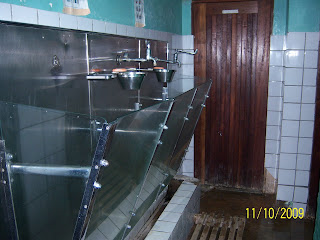
 Aren't I attractive in my surgical gear? The white apron is plastic, which is very hot. We have no a/c here of course and the windows are open for breeze. This is the secondary operating room, used for those who do not require ether, which is the only method they have of inducing unconsciousness. The door on the left leads to the break room of sorts, where we eat lunch. If we are operating and need something, we call out to whomever is eating, about 10 steps away and they don a mask and hand it to us. This operating tables wheels don't lock anymore, so the patient often moves about while we are operating on them.
Aren't I attractive in my surgical gear? The white apron is plastic, which is very hot. We have no a/c here of course and the windows are open for breeze. This is the secondary operating room, used for those who do not require ether, which is the only method they have of inducing unconsciousness. The door on the left leads to the break room of sorts, where we eat lunch. If we are operating and need something, we call out to whomever is eating, about 10 steps away and they don a mask and hand it to us. This operating tables wheels don't lock anymore, so the patient often moves about while we are operating on them.
This is the second bed in the secondary operating room and anything from gynecological (note the very comfortable stirrups) to hernia surgeries are done here. The floors are concrete.
This is a 4 year old boy who presented Thursday with massive ascites. His growth is obviously very stunted and his belly is full of fluid. His extremities and features are quite swollen. The doctors suspect Nephrotic Syndrome.



This little 3 year old boy had a circumcision and when we were done, they put him on the floor, in the corner, while they performed other surgeries. He was still out from anesthesia and he lay there for a couple of hours, which really bothered me. I kept asking about him and was quite worried that he wasn't being monitored. He finally woke up and his mother took him back to the Children's Ward.

This guy was a real treat! He's been a very non-cooperative patient, who is also a prisoner, on the Surgical Ward and he says that his leg was "shot with syringe full of parrafin by the police". He speaks no English either, but told the other nurses he's going to file charges against the police for trying to kill him. We were trying to explain to him that wax would harden as soon as it gets into a syringe and that couldn't possibly be the case. As suspected, when we opened his leg up in surgery, it was just massively infected from his gunshot wound and no wax was found! Imagine that?

This little baby girl was born c-section on Thursday night. Her 17 year old mother had been in labor for more than 2 days without delivery and when we finally delivered her, the umbilical cord was wrapped around her neck twice and she was quite blue. She's going to be fne though, but I thought it was funny that they placed her in an instrument tray and put her in the other room, while they finished with her mom. She was a nice sight after a long, hard 12 hour day of surgery for me.
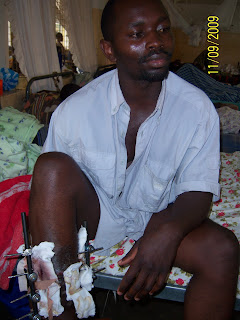
This guy was hit by a car while walking, in February and had his broken leg "repaired" by another facility. He came to us with a pretty bad infection, but did very well and was discharged yesterday. He was a very nice man.

This broke my heart. Robert, one of our wonderful doctors, asked me to assess this baby, after he noticed her lying on a bed of a patient's in the Family Ward yesterday. I unwrapped her blankets, which were soaked with urine (there are no diapers here) and found this. She's 6 months old and weighs 2.8 kg. (6.16 lbs.). Both she and her mother have AIDS and the mother has been very sick and her breast milk dried up. The mother told us that the baby developed diarrhea, so she stopped feeding her or giving her water more than one week ago!!!

Her name is Claire Favor and you can see the "baggy pants" that is the hallmark sign of severe malnourishment. I got her all cleaned up and got her some fortified milk (they use cow's milk, sugar and cooking oil) and she was so weak, she couldn't even suck a bottle.
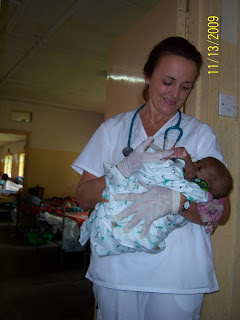
I finally got a syringe and fed her milk, a drop at a time, several times yesterday. I went back last night to feed her after Theater, as it was clear the mother was too ill to do so. Each person in the hospital comes with an "attendant" who cooks for them and does their laundry, etc., so we taught the attendant how to feed the baby. I went back today on my day off and checked her, but she's very irritable, won't really eat and has a high fever, which is not uncommon with AIDS. Tragic.


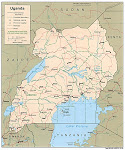














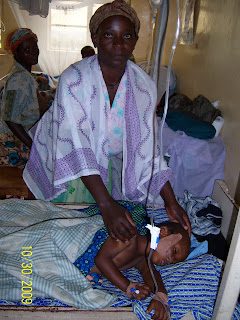






.JPG)



.JPG)
